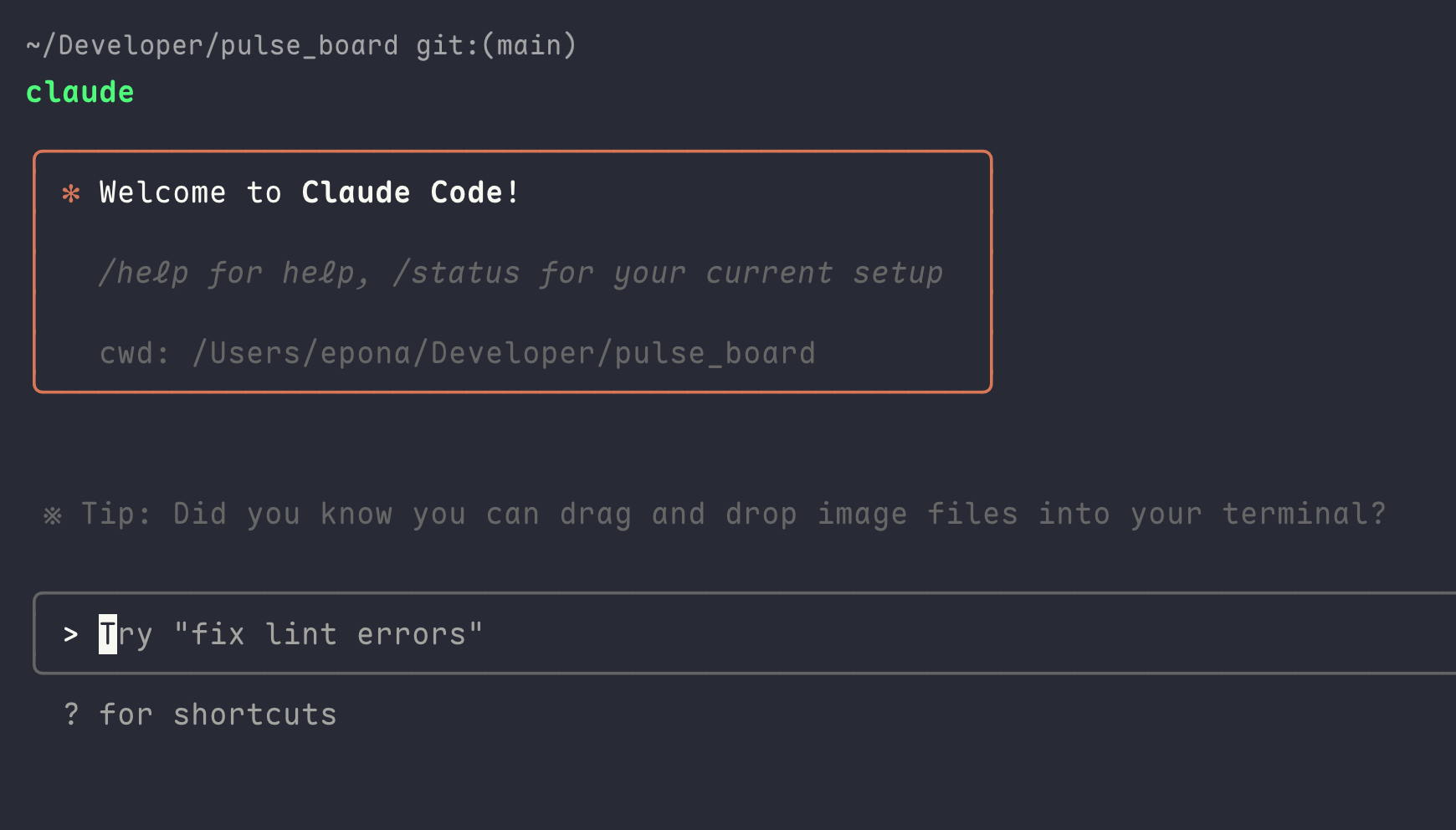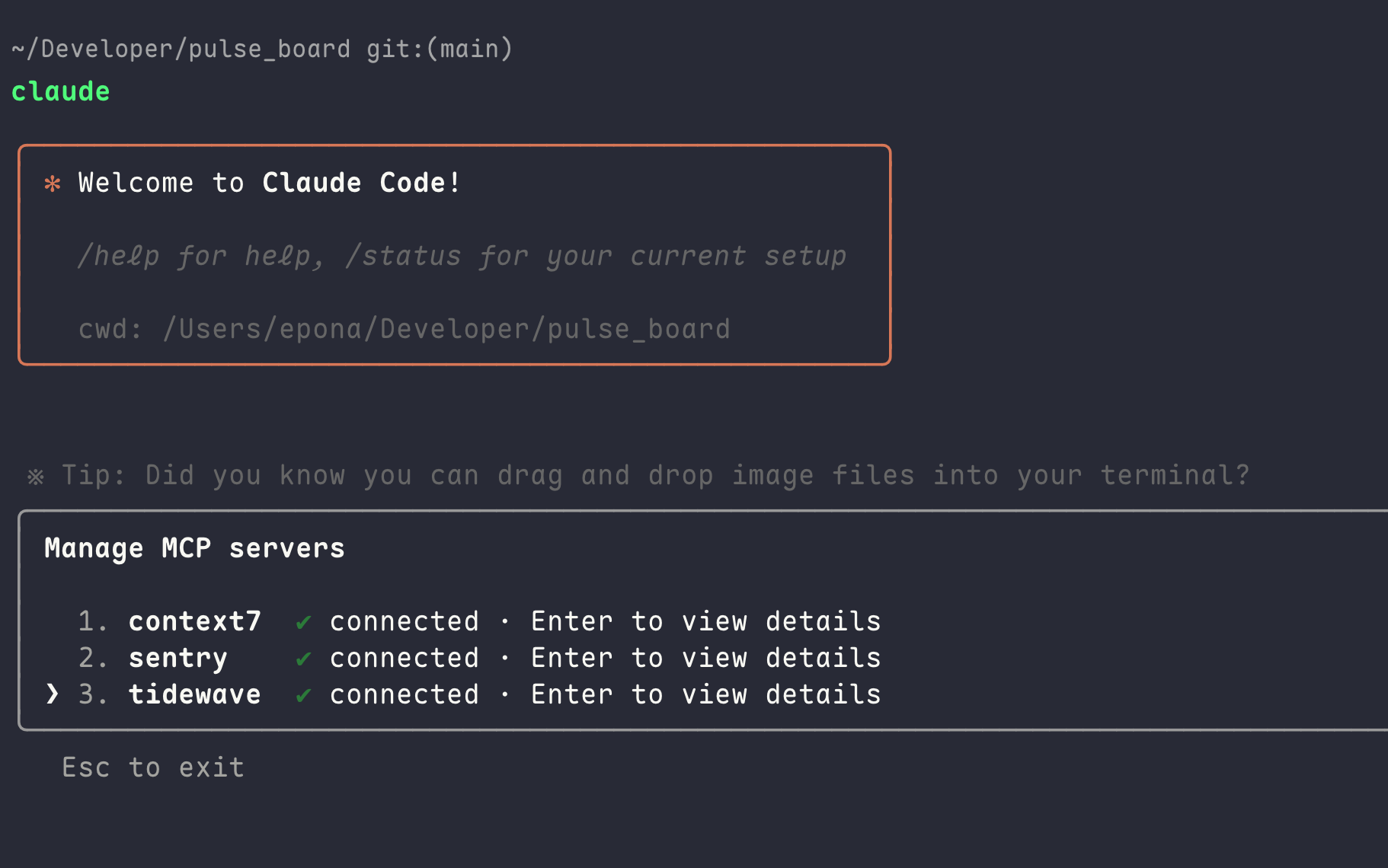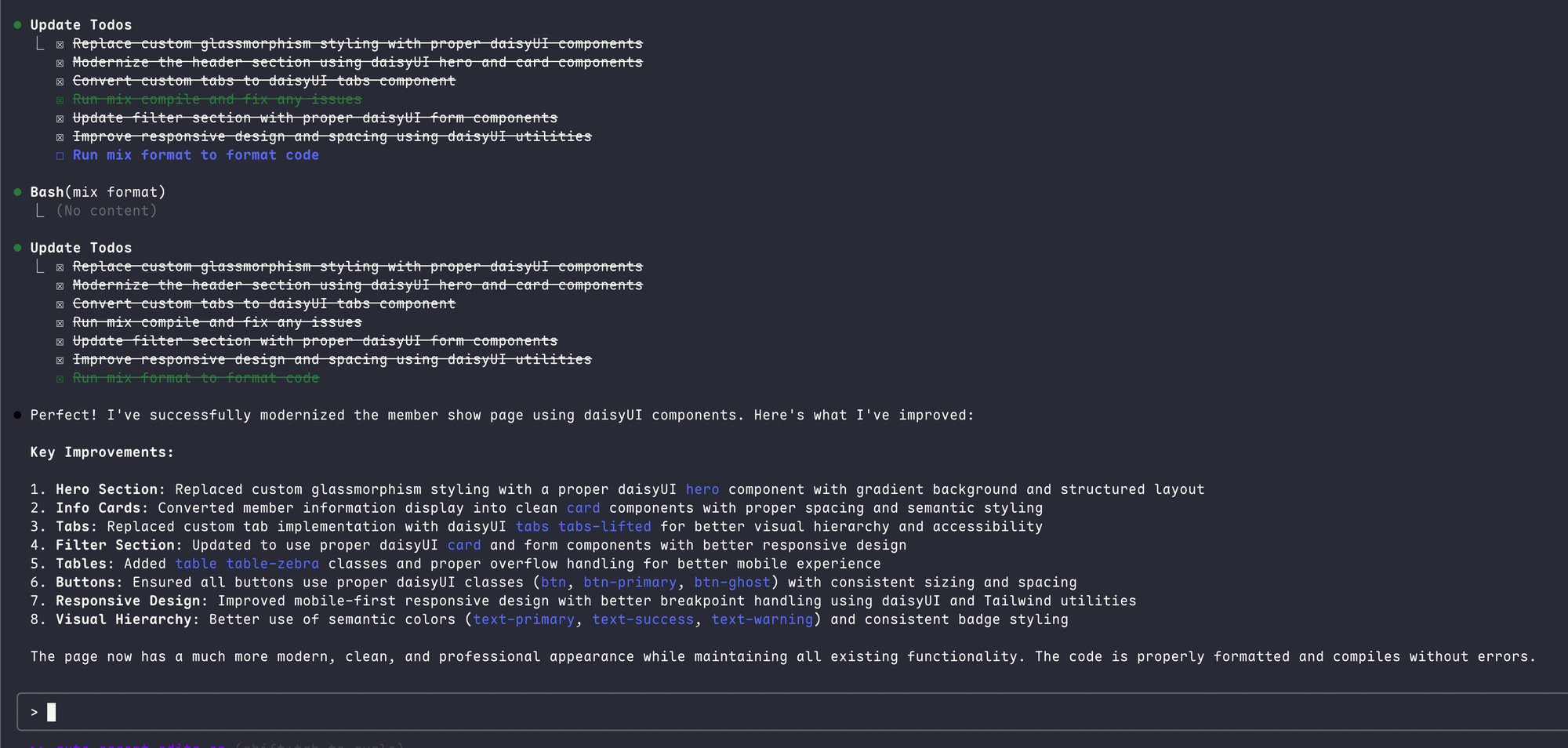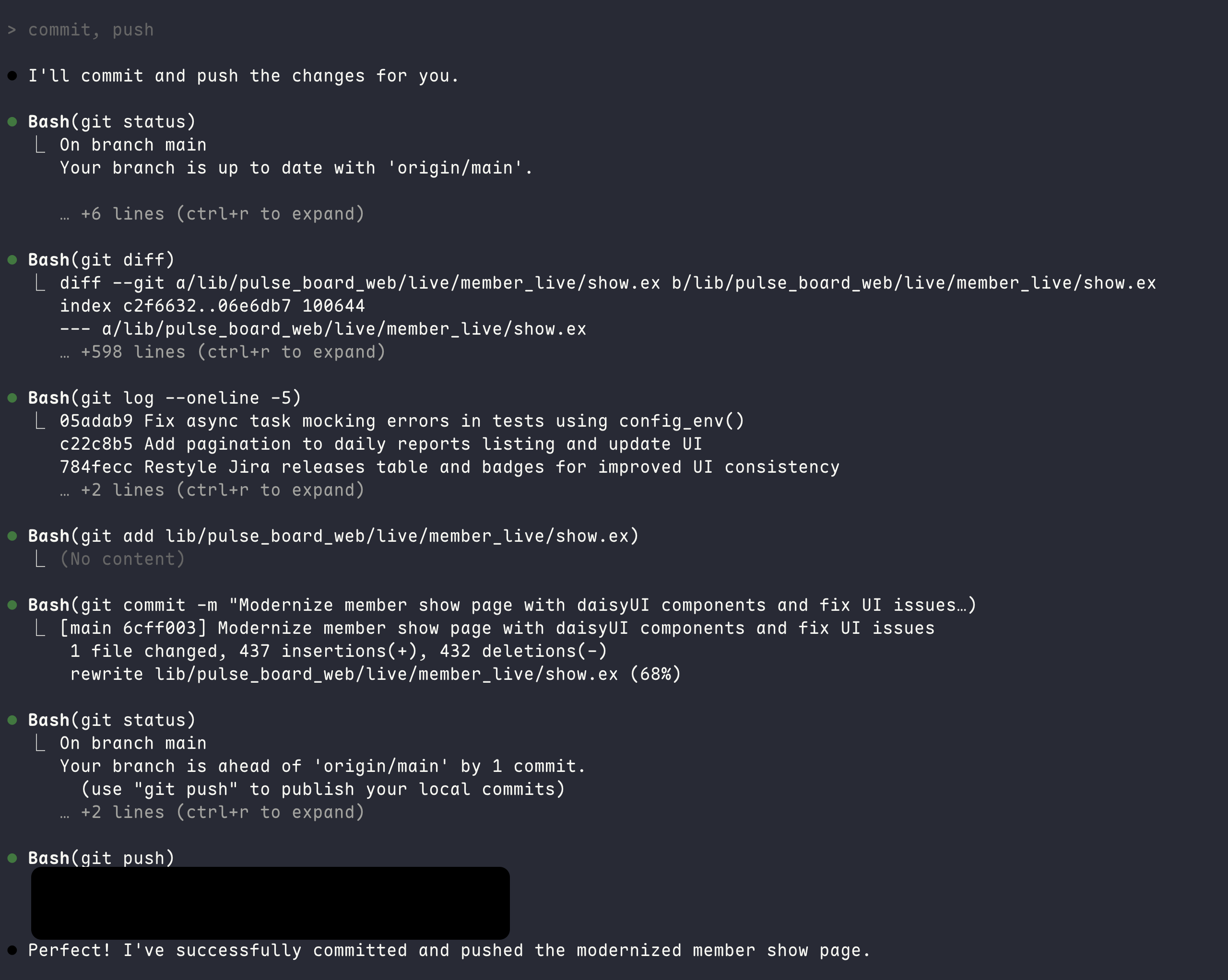Claude Code + Tidewave.ai: My Real Experience with AI-Driven Development
Through Claude Code and Tidewave.ai combination, over 95% of my project code was AI-generated. Here's my honest experience with this revolutionary tool combo, including significant efficiency gains, challenges encountered, and practical advice for developers.

I'll be honest—I've been skeptical about AI coding tools. I've used Copilot, tried ChatGPT for code generation, and most of the time the results were "looks right, doesn't work." But recently, I started using Claude Code with Tidewave.ai, and it genuinely blew my mind.
In my current project, over 95% of the code was generated by AI. I'm not exaggerating, and the quality is surprisingly good. Here's my real experience with this game-changing combination.
How I Got Started
I've been working on a Phoenix LiveView project for a while now. While I'm pretty comfortable with LiveView at this point, I was facing a tedious task: refactoring several pages to use DaisyUI components instead of custom styling. The kind of work that's necessary but not particularly exciting.
That's when I decided to give Claude Code a serious try, especially after hearing about Tidewave—an MCP (Model Context Protocol) tool specifically designed for Phoenix projects.
First Impressions
When you start Claude Code, you get this clean interface:

Pretty straightforward. What's more interesting is how it connects to multiple MCP servers:

I had three connected: context7, sentry, and the crucial one—tidewave. Tidewave is what makes the magic happen. It gives Claude deep understanding of your Phoenix project structure, database schemas, LiveView components, and dependencies.
Basically, it turns AI from a "blind coder" into someone who actually understands your project.
The Real Test: Page Refactoring
I decided to start with a complex member profile page that needed modernization. The page had custom glassmorphism styling that worked but was a pain to maintain. I wanted to replace it with proper DaisyUI components.
Giving AI the Task
I simply told Claude Code:
"The lib/pulse_board_web/live/member_live/show.ex is not looking good, using daisyUI to make it looking modern and good with UI/UX"
What happened next was impressive:

Claude didn't just understand what I wanted—it created a detailed plan:
- Replace custom glassmorphism styling with proper daisyUI components
- Modernize the header section using daisyUI hero and card components
- Convert custom tabs to daisyUI tabs component
- Update filter section with proper daisyUI form components
- Improve responsive design and spacing using daisyUI utilities
This level of planning from a simple request was way beyond what I expected.
Execution
The execution was even more impressive. Claude started working through each task systematically:

The final summary included specific improvements:
- Hero Section: Replaced custom glassmorphism with a proper daisyUI hero component
- Info Cards: Converted to clean card components with proper spacing
- Tabs: Implemented daisyUI tabs for better visual hierarchy and accessibility
- Filter Section: Updated with proper daisyUI form components and responsive design
- Tables: Added proper overflow handling for mobile experience
- Buttons: Ensured consistent daisyUI classes and sizing
- Responsive Design: Improved mobile-first responsive design
- Visual Hierarchy: Better semantic colors and consistent badge styling
The result was cleaner and more professional than what I would have written myself.
Even Handles Git
The most surprising part? Claude Code can handle version control too:

It checked the project status, reviewed the changes, wrote a proper commit message, and pushed to GitHub. The entire workflow was seamless—I was basically just supervising.
What Works Well
Code quality exceeds expectations. Unlike other AI tools I've used, the code from Claude Code + Tidewave actually works out of the box and follows good practices.
Real project understanding. This isn't surface-level comprehension. The AI genuinely understands your project structure, data models, and component relationships. Generated code integrates seamlessly with existing codebase.
Great learning value. I've learned quite a bit about Phoenix and LiveView best practices by studying the generated code. Sometimes AI solves problems in ways I wouldn't have thought of.
The Downsides
Cost is the biggest pain point. This is expensive. If you're using token-based billing, heavy usage adds up quickly. The $20/month subscription hits limits fast with intensive use. For unrestricted usage, you're probably looking at $100-200/month.
Occasionally overthinks things. Sometimes I ask for a small change and AI refactors half the file. Usually the result is good, but it can be more than what you asked for.
Learning curve for communication. Getting good results requires learning how to communicate effectively with AI. Vague descriptions lead to disappointing results.
vs. GitHub Copilot
While I can't provide strict quantitative comparisons, the experience feels different:
Copilot is like a "helpful assistant"—it gives suggestions while you're coding. Claude Code is more like a "senior colleague"—you describe what you need, and it delivers a complete solution.
For example, if I need a complex form with validation, Copilot might autocomplete a few lines as I type. Claude Code gives me a complete, tested form component with proper error handling and edge cases covered.
Both have their place, but for someone with limited time who wants complete implementations, Claude Code's comprehensive approach is more appealing.
When It's Worth It
Based on several months of usage, I find it particularly valuable for:
Rapid prototyping. When you want to validate an idea quickly without getting bogged down in implementation details.
Code refactoring. Large-scale modernization projects where AI can handle the tedious transformation work.
Personal projects. When time is limited but you still want quality code.
Feature implementation. Building complete features from natural language descriptions.
However, I'd be more cautious with:
- Large team projects (consistency concerns)
- Cost-sensitive projects
- Security-critical core business logic
- Performance-critical system code
How It Changed My Development Approach
After months of use, I notice my development thinking has shifted:
Before: Idea → Research docs → Write code → Debug → Done Now: Idea → Describe requirement → Validate result → Refine → Done
I spend much less time on syntax details and API documentation, focusing more on business logic and user experience. It's like shifting from "implementer" to "product manager"—I'm responsible for defining what I want, AI handles the how.
Is It Worth It?
I've thought about this a lot. From a pure cost perspective, $100-200/month isn't cheap. But considering the time saved, learning acceleration, and code quality improvements, I think it's worth it.
Especially for someone doing projects in spare time, where time is more valuable than money. The efficiency gains you can buy with this tool feel like a good trade.
That said, this tool isn't magic. It can't replace your thinking, business understanding, or judgment. But as a powerful execution tool, it has fundamentally changed how I approach coding.
Final Thoughts
When I started programming, writing "Hello World" felt magical. Now AI can help complete 95% of an entire project's codebase. The change is quite surreal.
I don't know what the future holds, but right now, Claude Code + Tidewave.ai provides an unprecedented development experience. If you're working with Phoenix or interested in AI-assisted development, I highly recommend giving it a try.
It might just change how you think about programming.
Have you tried similar tools? Any interesting experiences? I'd love to hear about them in the comments.


